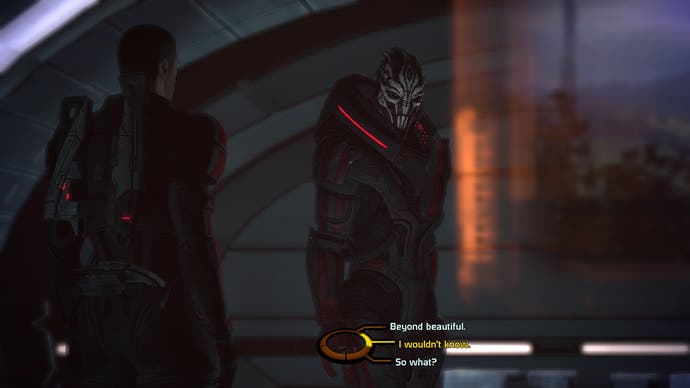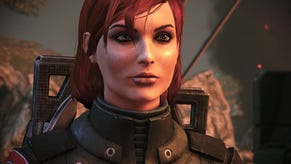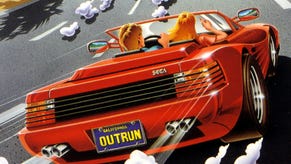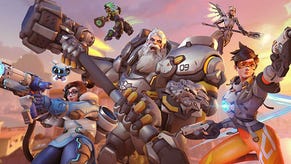Mass Effect
Pause for effect.
But the problems come around the edge of the system, where things become a little clunkier. While the shooting is improved, despite the Mako handling being apparently tweaked, it's still bloody rubbish. Maybe a Big Trak would have been more controllable. Similarly, the inventory management. You're only able to carry 150 items, after which you have to reduce them to Omni-Gel (which sounds a little unsavoury but is a generalised currency which powers a load of nano-tech abilities, like the hacking bypass). Problem being, you have to do them one by one. Having to stop after a few fights to clear a bit more space in a select-then-confirm way is just a tad tedious when the PC could do a drag-and-drop or multi-select mechanism easily enough.
And since the What Is New is out the way, this review can take a sharp turn to the left.
Despite everything I said earlier about KOTOR and Deus Ex and Gears of War (except I only thought that and didn't write it, as an Easter Egg for Eurogamer's telepathic readers), the game I found myself most wanting to compare Mass Effect to was none other than Shogun: Total War.
No, bear with me.
One of the core pieces of genius in Creative Assembly's design was the integration of the tactical battles and macro-scale strategic nation management. Rather than being lead by your nose through a pre-set campaign story, the battles ended up being more meaningful, more dramatic due to your knowing what they mean on the larger scale. So defending this ford isn't important because a cut-scene told you so; it's important because you know that it's the last point you can stop defenders before they reach your capital. It's using another genre (the turn-based strategy game) to elevate another (the real-time strategy game) without ever truly integrating the pair. They run in parallel with one another, with information passing between the two to enhance the experience of both.

And, basically, that's what Mass Effect does. While the strategy level (the RPG exploring/talking stuff) is clearly more linear than Total War, its point is to provide meaning and elevate the action sections. Kristan got quite a few Mass Effect fans' backs up by reviewing it primarily as a shooter... but after going through the game, I can see his point. That is, there's masses of stuff which isn't actually the action part - but, in terms of the actual progress of the game, it's the action which is paramount and everything else supports and enhances (or, occasionally undermines) that. Those hours of running around space-stations and chatting are to make the actual fight against the enemies dramatic. That you're defending civilisation is a hell of a lot more meaningful when you've seen the civilisation you're defending - compare and contrast to Halo 3, where there's none of that emotional punch. At its best, Mass Effect isn't about popularising the RPG - it's about re-imagining the shooter. It almost doesn't matter that its mechanics aren't quite as pure and polished as its direct competitors - everything around it makes it matter all the more.
It helps that BioWare proves itself deeply talented as a videogame storyteller. The writing is exemplary, mostly highly naturalistic with no desire to caper for your amusement. Making a science fiction epic takes a degree of balls, and BioWare has balls. Doubly so when it's created a universe from a whole cloth, with multiple species with their own traits, fairly sophisticated politics and a cast of memorable - but not cartoonish - freaks and heroes. The story managed a couple of real emotional gut-punches, which I clearly won't spoil. Hell, even the sex-scenes aren't completely embarrassing in context. In fact, the only bit I'd actually actively critique would be a couple of jingoistic excesses towards the close. But that's another piece, y'know? [We'll see. - Ed]



_bv0fQvp.jpg?width=291&height=164&fit=crop&quality=80&format=jpg&auto=webp)




